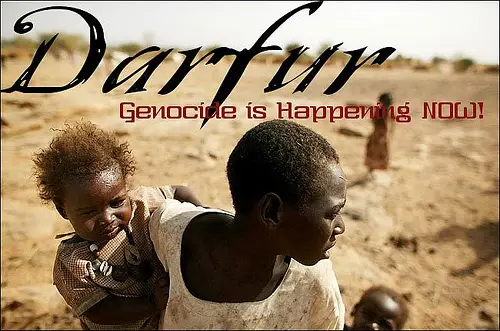One of the world’s worst humanitarian crisis – Darfur, Sudan - PART 2

In 2004, the United States government evidently referred the killings of the Darfur civilians at the hands of Janjaweed as ‘Genocide’. As said earlier the United Nations termed it as the world’s worst humanitarian crisis. These repeated attacks have emptied hundreds of Darfur villages and left millions stranded in the camps where their life has come to a standstill. Even for the supply of their daily essentialities of food, water, clothing and healthcare they are dependent on the humanitarian aid. Several diseases have erupted due to lack of hygiene and sanitization in refugee camps. Starvation and malnutrition has added to the crisis further.

In mid-July 2007, United Nations Security Council deployed around 26,000 peacekeepers to provide protection against these acts of war crimes and for promoting peace negotiations. UNAMID – United Nations-African Union Mission in Darfur is one of its kinds, the largest and costliest peacekeeping operations in history. But subsequently, the number of troops reduced in almost a year due to a meager supply of resources and ammunition to the deployed forces. The international community has also at times delayed or reneged on its promises of assistance for reasons best known to them.

This bloody conflict includes so many atrocities and crimes against humanity that the International Criminal Court after investigating has proclaimed Sudan President, Omar Hassan Al-Bashir a universal criminal. He was charged for war crimes, crimes against humanity and issued an arrest warrant in July 2009. International Criminal Court has blamed that instead of controlling the conflict, Bashir has played a key role in crushing of innocent and pushing the crisis further, thus creating an atmosphere of turmoil, turbulence and fear in Darfur. Despite the warrant, Bashir was reelected as President in Sudan again and still is in office. Warrants were also issued for Governor of North Kurdufan state of Sudan, Ahmad Haroun and Janjaweed militia leader Ali Kushayb.
Meanwhile, South Sudan which seceded from Sudan in the year 2011 faced similar neglect and atrocities at hands of the Sudanese government since it became independent in 1956. Incidentally Sudan levels its own allegations against the South Sudan for its links to rebel groups fighting for increased autonomy in Darfur during a nearly decade-long conflict there.

Darfur saw its much needed peace for a very brief time in the year 2013. Later a war of words involving local tribes, government, army and militias again started spurting sparks of violence in the region. Since then lootings, arrests, murders, rapes, skirmishes, etc. have again become the order of the day with vengeance being the only rule followed. Figures coming from helpless human rights agencies and watchdogs indicate displacement of close to a million people from the region while the number of deaths largely unknown owing the lack of information being available from this part of the world which is today a ‘jungle rule’ in actuality.
The underlying factor is that the plight of this remote war-afflicted region got very less media coverage over the years. Darfur almost slipped off international headlines. It is only after ten years of immense destruction that Darfur is now gaining humanitarian aid at a steady pace. The sufferings of the Darfuris are at such an immense level that they cannot be jotted down on a piece of paper. With every sunrise, the Darfuris face a new challenge and wake up with fresh hope in their hearts.
-The End-

